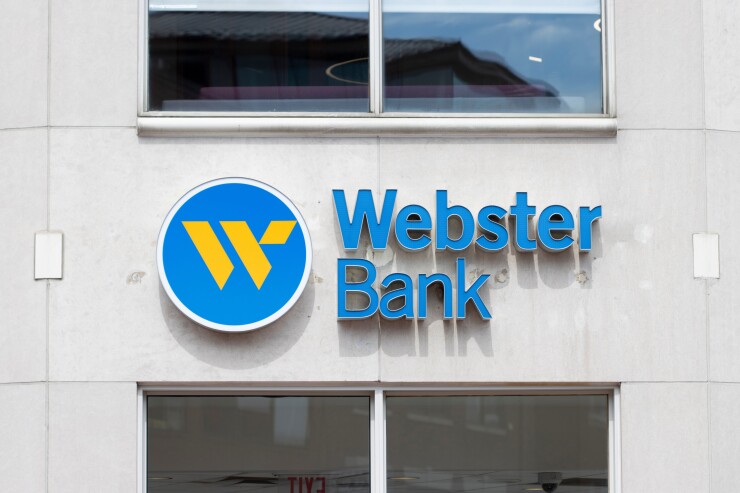
Webster Financial is feeling more optimistic than some other banks about loan growth in 2024.
Backed by a solid pipeline of commercial loans, the Stamford, Connecticut, company with $74.9 billion of assets is projecting loan growth of 5% to 7% for the full year, executives said Tuesday.
Much of the anticipated uptick should show up in the nonoffice commercial real estate space as well as in public finance, general commercial-and-industrial lending and private equity funding, President and CEO John Ciulla said during the company's fourth-quarter earnings call. Transaction-based activities, such as buying and selling certain assets and businesses, are also picking up, which is adding to the company's confidence around overall loan growth, he said.
"The good news from our vantage point is that … we've got a good finger on the pulse of our pipeline and our clients, and the markets and sectors we serve," Ciulla said during the call. "We're not projecting that with a hope-and-pray attitude that the market conditions improve."
"Right now, we've got a good level of confidence that 5% on the low end of the range is something that's attainable without taking too much risk and continuing to execute … within our underwriting boxes and with our existing strategies around segments and geography," he added.
Webster's lending outlook comes at a time when other banks, including some of Webster's larger regional peers, are tempering their loan growth expectations. For example, Regions Financial in Birmingham, Alabama, expects loan growth to be "relatively muted" this year, due to higher interest rates, economic uncertainty, geopolitical conditions and the U.S. political climate, President and CEO
KeyCorp in Cleveland is
That said, some other banks are predicting growth. On Tuesday,
Part of Webster's enthusiasm about future loan growth stems from an increase in loans between the third and fourth quarters. Loans were $50.7 billion in the fourth quarter, up 1.3% from the prior quarter, the company said Tuesday. Plus, loans were up 1.9% year over year.
In the fourth quarter, total commercial real estate loans rose 7.6% from the year-earlier quarter. Webster has reduced its exposure to office loans by nearly $700 million over the course of the previous five or six quarters, Ciulla said.
Meanwhile, "we're not really seeing any degradation in nonoffice," he said. "We seem to be managing maturities well, and sponsors and owners seem to be connected to their loans."
As for the other side of Webster's balance sheet, executives are expressing similar optimism.
Like loans, deposits are expected to increase 5% to 7% for the full year, in part because of Webster's pending acquisition of Ametros Financial, a custodian and administrator of medical funds from insurance claim settlements. Announced in December,
Those $804 million of deposits, which have more than doubled over the past three years, are projected to increase at a compound annual growth rate of about 25% over the next five years, and their average duration is more than 20 years, Webster executives reiterated Tuesday.
After noting on the call that "on the surface, [25%] seems like a pretty aggressive kind of growth target," analyst Brody Preston of UBS Securities asked Ciulla and Chief Financial Officer Glenn MacInnes to explain why they think that percentage is "appropriate" and whether there might be room to "outperform."
"The upside is really our opportunity to figure out new ways" for the team at Ametros to keep growing," Ciulla said. "But in terms of our baseline, 25% CAGR growth, we feel very confident that that's kind of a very predictable, strong line of sight to that growth over the next five years."
The acquisition should "close shortly," Ciulla said.
Webster's net income for the quarter was $185.4 million, down more than 24% year over year. Earnings per share were $1.05, down from $1.38 in the year-earlier quarter and falling short of the average estimate of $1.48 per share from analysts surveyed by FactSet Research Systems.
The decline in Webster's net income was largely due to a special Federal Deposit Insurance Corp. assessment of $47.2 million as well as merger-related charges of $30.7 million. The company also recorded a $16.8 million loss on the sale of investment securities, it said.
Noninterest expenses totaled $373.2 million for the period and $1.4 billion for the entire year.
For 2024, noninterest expenses are expected to be somewhere between $1.3 billion and $1.33 billion, the company said. That estimate includes about $50 million related to the acquisition of Ametros.






